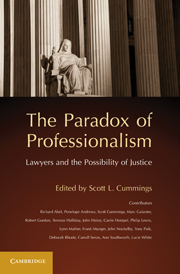Book contents
- Frontmatter
- Contents
- List of Tables and Figures
- Contributors
- Preface and Acknowledgments
- 1 Introduction
- PART I LAWYERS AND THE PUBLIC GOOD: THE FUNDAMENTAL DILEMMA
- PART II LAWYERS AND THEIR CLIENTS: DETERMINANTS OF ETHICAL PRACTICE
- 6 How and Why Do Lawyers Misbehave?
- 7 Aspects of Professionalism
- 8 Professional Regulation and Public Service
- 9 An Innovative Approach to Legal Education
- PART III LAWYERS AND SOCIAL CHANGE: MOBILIZING LAW FOR JUSTICE
- 14 Epilogue
- Index
- References
8 - Professional Regulation and Public Service
An Unfinished Agenda
Published online by Cambridge University Press: 05 June 2012
- Frontmatter
- Contents
- List of Tables and Figures
- Contributors
- Preface and Acknowledgments
- 1 Introduction
- PART I LAWYERS AND THE PUBLIC GOOD: THE FUNDAMENTAL DILEMMA
- PART II LAWYERS AND THEIR CLIENTS: DETERMINANTS OF ETHICAL PRACTICE
- 6 How and Why Do Lawyers Misbehave?
- 7 Aspects of Professionalism
- 8 Professional Regulation and Public Service
- 9 An Innovative Approach to Legal Education
- PART III LAWYERS AND SOCIAL CHANGE: MOBILIZING LAW FOR JUSTICE
- 14 Epilogue
- Index
- References
Summary
INTRODUCTION
When I began teaching and writing about legal ethics some three decades ago, the field was barely a field. “General piffle” was how an early scholar of the profession described the field. Some leading exceptions are represented in this volume. Unlike much of the pompous moralizing that had previously characterized the field, this new work drew on research in law and society and critical legal theory. And unlike more conventional professional responsibility approaches, this scholarship tended to be skeptical of incremental reform, particularly the bar's efforts to reform its regulatory structures and promote public service. Shoring up a bankrupt structure was how many of us saw it.
So what were the alternatives? Here accounts differed. In a 1981 law review symposium, Richard Abel, one of the most influential voices, presented deficiencies in lawyers' ethics as inherent in a liberal capitalist system that privileged profits and value-free conceptions of professional roles. On the prospects of reforming that system, he was diplomatically silent. By contrast, I suggested that “to affect significant improvements in the cost, quality, and delivery of legal services, the bar must accept fundamental changes in its regulatory structures,” changes in which the public would have a much greater voice. On how those changes could be achieved, I was similarly silent.
- Type
- Chapter
- Information
- The Paradox of ProfessionalismLawyers and the Possibility of Justice, pp. 153 - 168Publisher: Cambridge University PressPrint publication year: 2011



